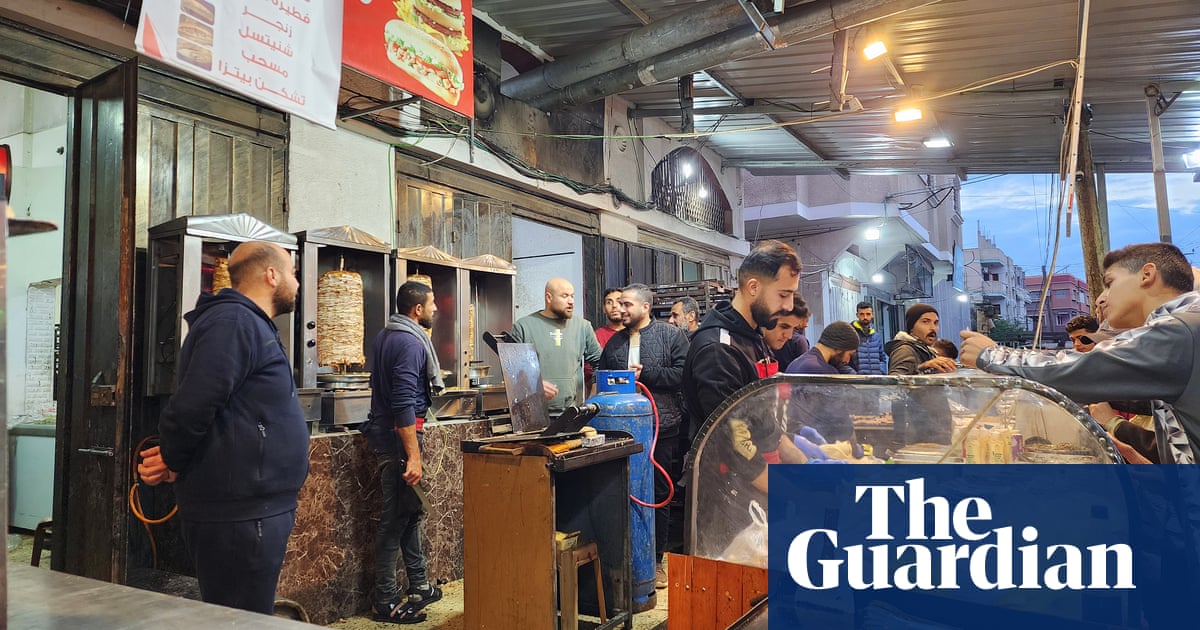It is a Thursday night in Khan Younis and business is good at the al-Sawafiri restaurant. Not far away, entire blocks have been reduced to rubble, but here, in this small corner of the city in the southern Gaza Strip, the damage is less extensive. Raed al-Sawafiri, the owner and manager, stands in front of chicken rotating on a grill and smiles. Every one of his plastic tables is occupied.
Al-Sawafiri had no experience of the restaurant trade until very recently. Displaced 10 times during the 16-month conflict in Gaza, the 23-year-old opened his first establishment in Rafah, the southernmost city in the territory, early this year, after sourcing old equipment and sending his father to the border with Egypt to buy meat.
“The response from people was amazing, but we had to flee the [Israeli] attack on Rafah and move to the coast. Finally, I decided to try again in Khan Younis and, thanks be to God, we have had success,” he said.
The restaurant is one of thousands of small businesses created during the war by desperate residents seeking to survive economically. Planners now hope such initiatives will help drive reconstruction efforts – if the ceasefire holds and Donald Trump revises his plan for the US to “own” the territory, displace its population of more than 2 million and transform it from a “demolition site” into the “Riviera of the Middle East”.
Al-Sawafiri risked death or injury to furnish his restaurant, scouring Gaza despite the Israeli offensive, which has reduced much of the territory to shattered ruins.
“Sometimes, I had to walk long distances to fetch water, and at times, I would search in areas like Deir al-Balah and Rafah and buy the necessary equipment at any cost, and it was hard to find skilled chefs and quality spices, but I did not give up,” he said.
Only a handful of such establishments exist but their popularity is a testament to the resolve of Palestinians in Gaza, observers say, where more than 90% of homes have been damaged or destroyed, along with almost all basic infrastructure.
Projections from 2024 estimate that just clearing Gaza’s rubble, which is contaminated by toxic chemicals and unexploded bombs, would take a fleet of 100 lorries 15 years.
Yet many in Gaza say they are determined to rebuild, posting videos on social media of efforts to clear their homes of rubble, or pizza vans working their way through the ruins.
“They are heroes,” said Yara Salem, a former World Bank executive based in Ramallah who has worked with communities in Gaza on a new redevelopment plan. “It is superhuman, their ability to live and relive. We have this in our blood. We are not going to live on handouts in a refugee camp. I am a Palestinian and I have never seen such resilience like I see in Gaza.”
In Khan Younis on Thursday evening, families sat down to share dinner in restaurants such as al-Sawafiri’s – some for the first time since the beginning of the conflict in October 2023.
Nivin Qadeh, 38, said: “The last time we went out was three days before the war started. The whole family went out on a trip before the school year began for our children.
“We used to go out often, and could give our children whatever they asked for. But now we have lost our house and all our savings, so it is very difficult. For this one evening, we can forget our troubles.”
Qadeh’s family was displaced from their home east of Deir al-Balah at the start of the Israeli offensive, which has killed at least 47,000 people, mostly civilians. The war was triggered by a surprise attack by Hamas into Israel that killed 1,200 people, also mostly civilians, with 250 taken hostage.
Qadeh said: “There are still fears of the war returning because the ceasefire is conditional and not permanent. I am very afraid that … the war will return as before. What will happen next is unknown, but we make the most of every minute during the ceasefire to feel a little psychological stability and have life return to normal, even if just a little.”
Despite the efforts of aid agencies, food in Gaza remains scarce. While some prices fell between December 2024 and January 2025, many basics are up to 12 times more expensive than before the war. And though a third of households surveyed reported improved access to food, according to the UN, many are still eating little more than bread and tinned vegetables. The most recent statistics reveal more than 1 million people are facing “emergency levels of food insecurity” or worse.
Fuel is also a major problem, with no electricity and very little gas. For months, waste plastic and wood have been used for cooking, but these are scarce now, too.
Those with regular incomes can afford the occasional meal from a restaurant. Sihaam Abu Ghmeil, 29, who works for an international NGO, said he had come to the Fahd restaurant in Khan Younis to buy lunch for his family.
“This was always one of my favourite restaurants. The last time I came was before the war, on the Thursday night just before the war began. We went out as a family, had dinner outside, and some sweets, and stayed until late at night. That was the last family outing,” Abu Ghmeil said.
“I will delete all memories of the war from my mind completely. In the future, I do not want to remember anything from this time. I only want to hold on to the happy and beautiful memories of Gaza before the war, for fear that those days may not return.”
Nearby, Ahmed Hamad, a 19-year-old from Beit Hanoun who was a member of a traditional dance company before the war, was enjoying a shawarma kebab.
He said: “Now, we feel some relief thanks to the ceasefire, and we walk the streets feeling more at ease. We are now able to go out to enjoy shawarma or sit in cafes, which is really important because we need to find ways to release our emotions after such a long period of tension.”
On the night before the war, Hamad was performing in a restaurant in the Jabaliya camp, now reduced to ruins. “The atmosphere was very nice during those days, and I can’t forget them. When I remember those moments, I feel deep sadness,” he said.
He is not among those planning to rebuild Gaza, and is hoping for a life elsewhere: “I will be one of the first to leave when the crossing opens for travellers, because the situation here has become unsafe, and I prefer to go to a safer place.”
Article by:Source: Malak A Tantesh in Khan Younis and Jason Burke















